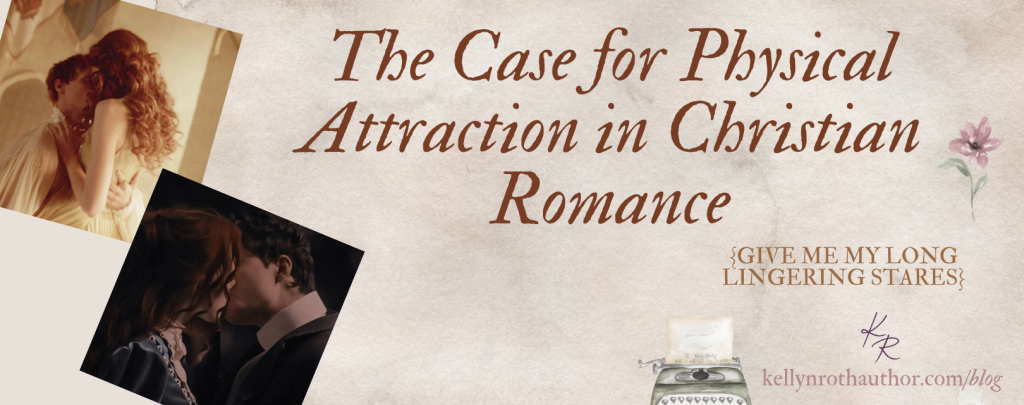
Lately, y’all have been acting … well, exactly the same as you always have acted about physical attraction in Christian romance. Yet as an adult, with adult thoughts (okay, childish thoughts, but at least I AM an adult, technically), I feel a need to sit down and write another post about it.
I’m sure you’ve seen posts about this circling around, both from the POV that Christian romance should NOT include physical attraction of any type and from the perspective that it’s a travesty that anyone would suggest that such a pure romance is a possibility.
I, as always, see both sides. I lean more toward one than the other (see the title), and I am going to say some things that are pretty aggressively … well, on my side of the issue, as per always.
That said, if you like my rants, you’re in for a treat, because in my own way, I am going to RANT. Because for heaven’s sake, let them STARE LONGINGLY AT EACH OTHER!!!

My premise is simple: we Christians give physical attraction in Christian romances a hard time for virtually no reason … and though it’s okay to not write it, and not enjoy reading it (and therefore, yes, your reviews should reflect your lack of enjoyment – never say I am encouraging dishonest reviewing!), it’s not okay to diss it in moralistic terms.
And maybe it’s worth rethinking if your convictions are founded in true godliness … or if you’re just uncomfortable with sexuality because, you know, you were raised a Christian and saying the word “sex” is worse than most other sins.
More on that later.
Let’s start with the Bible’s view on romance.
Breaking Down “Song of Solomon” in Romance Terms
Let us refer to a lovely book in the Bible called “Song of Solomon.” Though not a book containing explicit descriptions of sexual acts, it does contain explicit descriptions of physical ATTRACTION.
And the thing is, if it is CELEBRATED in the Bible, it can sure as heck be portrayed in a Christian novel while honoring God.
Behold, you are fair, my love!
Behold, you are fair!
You have dove’s eyes.Behold, you are handsome, my beloved!
Yes, pleasant!Song of Solomon 1:15-16 NKJV
These are pretty general, and I think 90% of Christian authors agree that general statements like this are appropriate, but due to the nature of this type of poetry, there are some … moderately explicit lines? Though you could argue that they’re not explicit depending on your interpretation.
That said, if you have even the littlest bit of a dirty mind … yeah, reread Song of Solomon as an adult.
However, for non-explicit but certainly specific lines, you need look no further than the surface level.
All From Various Points of Song of Solomon, NKJV
“O my dove, in the clefts of the rock,
In the secret places of the cliff,
Let me see your face,
Let me hear your voice;
For your voice is sweet,
And your face is lovely.”Your lips are like a strand of scarlet,
And your mouth is lovely.
Your temples behind your veil
Are like a piece of pomegranate.
Your neck is like the tower of David,
Built for an armory,
On which hang a thousand bucklers,
All shields of mighty men.
Your two breasts are like two fawns,
Twins of a gazelle,
Which feed among the lilies.You have ravished my heart,
My sister, my spouse;
You have ravished my heart
With one look of your eyes,
With one link of your necklace.Your lips, O my spouse,
Drip as the honeycomb;
Honey and milk are under your tongue;
And the fragrance of your garments
Is like the fragrance of Lebanon.My beloved is white and ruddy,
Chief among ten thousand.
His head is like the finest gold;
His locks are wavy,
And black as a raven.
His eyes are like doves
By the rivers of waters,
Washed with milk,
And fitly set.
His cheeks are like a bed of spices,
Banks of scented herbs.
His lips are lilies,
Dripping liquid myrrh.
Okay, now let’s go ahead and talk about those in romance terms … and see if any of y’all have condemned lines just like this despite the fact that they’re kind of in the Bible.
“O my dove, in the clefts of the rock,
In the secret places of the cliff,
Let me see your face,
Let me hear your voice;
For your voice is sweet,
And your face is lovely.”
Based on this, I argue that it is within a Christian romance author’s ability to:
- Have a couple long to see each other.
- Desire to just see the other person
(and gaze longingly at them). - Be attracted to their voice.
- Find their face lovely & be attracted to their face.
Simple stuff. But let’s keep going.
Your lips are like a strand of scarlet,
And your mouth is lovely.
Your temples behind your veil
Are like a piece of pomegranate.
Your neck is like the tower of David,
Built for an armory,
On which hang a thousand bucklers,
All shields of mighty men.
Your two breasts are like two fawns,
Twins of a gazelle,
Which feed among the lilies.
Based on this, I argue that it is within a Christian romance author’s ability to:
- Have characters look at and notice each other’s lips.
- Be attracted to specific bits of them (neck, mouth, temples,
breasts). It’s tasteful and poetic, but it’s there. - Given that the Bible literally talks about breasts, I’m becoming a lot less judgmental of men noticing curves and women noticing muscles, too. Just sayin’.
You have ravished my heart,
My sister, my spouse;
You have ravished my heart
With one look of your eyes,
With one link of your necklace.
Based on this, I argue that it is within a Christian romance author’s ability to:
- Have couples be blown away by each other and be unable to take their eyes off each other.
Probably be a little awkward because of it, because goodness, having one’s eyes be ravished cannot be comfortable.
Your lips, O my spouse,
Drip as the honeycomb;
Honey and milk are under your tongue;
And the fragrance of your garments
Is like the fragrance of Lebanon.
Based on this, I argue that it is within a Christian romance author’s ability to:
- Yes, we can definitely have our couples STARE AT EACH OTHER’S LIPS.
- And want to kiss.
- And noticing smells is okay, too!
Though it may create unrealistic expectations because my husband only smells nice directly after he’s showered or when I haven’t seen him in at least two weeks and I’m not 100% sure those two facts are not related.
My beloved is white and ruddy,
Chief among ten thousand.
His head is like the finest gold;
His locks are wavy,
And black as a raven.
His eyes are like doves
By the rivers of waters,
Washed with milk,
And fitly set.
His cheeks are like a bed of spices,
Banks of scented herbs.
His lips are lilies,
Dripping liquid myrrh.
Based on this, I argue that it is within a Christian romance author’s ability to:
- Point out that couples have a nice tan or whatever the fashion for skin tone is.
- Be attracted to each other’s dreamy hair and eye color and be gushy about it.
- I guess … be attracted to each other’s … cheeks?
- Again, the lip thing! Let them stare at each other’s lips!
One thing I will note: some will argue that the Song of Solomon couple is about an engaged or even married couple, and outside of those two institutions, portraying attraction is wrong.
I … disagree?
Why? Because we have to experience attraction before we are married. It is inadvisable though not impossible to marry a person you are not attracted to. And I’ll discuss the difference between attraction and lust later, but for now, there is a difference.
Another point I’d like to make is that the couple in Song of Solomon are equally attracted to each other’s characters. A big part of their married love is them celebrating how noble the other person is! So let’s never neglect that aspect in our romances, either.
Now that we’ve got that out of the way …
Let’s talk about some other elements.

How Should Physical Attraction Be Portrayed?
My biggest factor for talking about any topic is this: be honest and use realism without feeling a need to go on for years and years about something that can be discussed in a few words.
That said, every author has a different style, and honestly, what I’m seeing more often than not is that some people are rubbed wrong by certain author’s styles being a little more on the descriptive side.
I am not one of those people, but I understand it.
And honestly, I have read romances that felt like they had too much physical attraction, but it was not because of the level of description or how much the characters were actually attracted to each other … it was because that was the only aspect of their relationship.
I feel like enemies-to-lovers can be a trope that commonly suffers from this narrative. Why? Because physical attraction is a kind of shorthand.
Like the kiss can sum up the feelings of commitment a couple is experiencing, physical attraction can sum up all the other types of attraction going on between a couple. That said, in an enemies-to-lovers narrative, it is easy to miss all those other elements because the couple is actively trying to avoid falling in love with each other. (If you’d like to read more of my thoughts about enemies-to-lovers romances, you can click here.)
And guess what? Fighting physical attraction can be an easy shorthand for showing fighting all other types of attraction – spiritual, emotional, mental.
Second on that list in terms of “easy to show” is emotional attraction. All the gooey-gushy feelings. The other two types are harder to portray but definitely worth it.
All types of romances can suffer from the issue of replacing all attractions with physical attraction. The problem happens as soon as the reader begins to believe that the couple is solely physically attracted to each other. That makes it seem like physical attraction is the sole focus of the story … and in some cases, that may be true.
That said, if you are taking time to develop the spiritual, emotional, and mental sides of your characters’ chemistry toward each other, you will not suffer from this problem.
Further, using these types of “shorthands” is not always a problem. You don’t have to, but it allows you to say to the reader, “THIS IS A ROMANTIC COUPLE” even if you haven’t written chapters and chapters of slow burn first.
Also, assuming you’re not writing about blind characters, you probably shouldn’t be dating/courting someone you can’t stand to look like in the first place, so I’d say attraction of some sort is a good first step.
With all this in mind, though, I want to again say that physical attraction is easy to imply and therefore a little easy to overdo. Though not inherently “spicy,” it’s like a spice.
Don’t dump six pounds of paprika into a dish. Season it.
Which leads me, at least, to a question:
Does the fact that physical attraction is easy to imply mean we should tone it down?
Yes … and no?
Again, your characters are failing to grow a relationship because they’re just physically attracted to each other and nothing else, then removing the physical attraction won’t fix the story. Fixing the story will fix the story. Adding character development and more than that, relationship development, is a must.
However, in a well-written romance, in which every aspect of romantic love is given equal time, or as much time as befits the couple (more on that later), there are no hard limits for physical attraction.
And as I mentioned before, it can work as a shorthand for growing love in romantic stories … and that’s okay. It’s not always a synonym for laziness. It only becomes lazy when it’s the only thing and is used to imply a relationship … where none exists.
Where nothing but lust exists.

Which brings us to another question …
Is attraction always lust?
Nope. Nope, it’s not.
The dictionary definition of lust is “very strong sexual desire.” Now, that is certainly an element of attraction, but I argue that the Biblical definition of lust as characterized in many passages in the Bible is different than a simple strong sexual desire (which is something couples who are deeply and healthily in love experience).
In this context, I define physical attraction as being attracted to the way someone looks, sexual attraction as a desire to have healthy sex with someone, and lust as an overwhelming sexual desire that fails to take into account morality and godliness, your own personal health (emotionally, physically, and spiritually), and the similar needs of the other person.
So is there such a thing as lust in a marriage? Yes. There’s such a thing as lust in any relationship. There’s no “and now we’re safe!” when it comes to lust. If you only lusted after someone before marriage, that will continue after marriage.
Further, I think the Christian attitude toward sex encourages lust. That’s a bigger topic than I can discuss here, but one such example is how we talk about male sexuality. Supposedly, men always have higher sex drives, their desire to have sex is a “need,” and it’s the duty of a wife to give in to what essentially becomes pure lust – absent of love for the woman, of morality, and of self-control. Of course, women can experience lust and act upon it in a marriage (or otherwise), too.
Though elements of this are rooted in Biblical thought, they are not actually Biblical. Again, bigger topic than we have time for, but let’s move on.
But what does this mean for writing romances? Well, when you’re writing along, take some time to think about the physical attraction your characters are experiencing toward each other and how they’re acting on it.
Is it purely because it serves them? Are they just wanting to indulge a fantasy or do they genuinely care about the other person? Are they look for a trophy spouse or do they legitimately care about the person behind the pretty face and sexy body?
Lust destroys. Love builds up.
Basically, you will know them by their fruits. So take time to show those fruits between your characters!
Yet that makes me think of another element of this whole discussion that I sometimes wonder about. Clean fiction has become almost synonymous with Christian fiction for some people … and for others, it seems to have become more important to write clean fiction than to write godly fiction.
That bothers me.
And it makes me wonder …
Is there a point where not wanting attraction to be present in romance novels becomes an obsession in and of itself?
Let me break it down further.
The thing is, cleanliness is not next to godliness. That’s not in the Bible, and there’s probably a reason for it. 😉 The Bible itself is an honest book, and there are several passages (not from Song of Solomon) that mention a man or woman’s physical attraction as a matter of fact. It’s not a book that needs to take paragraphs to explain things, but it does honestly lay out a lot of topics that Christians are not comfortable discussing … and that bothers me.
Our focus seems to have shifted from writing counter-cultural stories that depict God’s love and greatness moving about in the world and amongst people to … writing things that don’t discuss any sin.
I’ve seen books reviewed negatively for MENTIONING sins (such as homosexuality, even when condemned or not directly discussed) … or even situations that hint at sin (such as having a character be illegitimate, which is not a sin on the character’s fault but rather their parents) … or having character sinned against (such as mentioning rape).
Trigger warnings and/or avoiding these subjects for children under 13 is one thing, but refusing to ever discuss real-world situations in the name of honoring God? I’ve never heard of anything less godly.
Further, though I cannot speak to every situation, in most cases, it is not healthy to continue hiding from a subject you are sensitive to all your life. I personally consider it personal growth to confront situations I find make me uncomfortable. I want to be ready and able to confront any situation God brings to me.
And how am I going to be able to do that if I insist on staying inside my comfort zone? Our goal as Christians should NOT be comfort! I think we should all (when healthy and able) pursue discomfort (as long as we’re not using it to punish ourselves like 13th century monks because that is awful) to a healthy degree.
I’ll get off my soap box about that, but again, I’ll just say that cleanliness is not next to godliness. It’s not even on the same platform as godliness. It’s way over there, far away from godliness, doing its own thing. Maybe it’s being influenced by godliness at times … but not always.
To get back on track, I want to say that … sometimes I think Christians are not “obsessed” with sex ENOUGH if they’re complaining about normal, harmless physical attraction (or “noticing”) in romance novels.
Or to put that in a clearer manner, being obsessed with something being unhealthy (yes, a lack of physical attraction in a romantic relationship is UNHEALTHY!) and nonexistent (when in reality, romantic couples are/should be attracted to each other) is also an obsession.
Essentially, I feel like sometimes y’all talk about it not existing so much that you make it weird. You’re so obsessed with building a fence around the perfectly find fences that already existed (don’t lust and don’t have sex before marriage, essentially) that you make it WEIRD.
STOP. MAKING. IT. WEIRD.
WRITE. REAL. PEOPLE.
Does this mean that I personally think it’s always weird when a romance author chooses not to include physical attraction? No, absolutely not. However, it can be, and I’ll discuss more of that in the next section!

If you want to write physical attraction free romance, how do you do it?
Carefully and intentionally and with an open mind that may someday be changed by God. *shrug*
So here’s the biggest thing you need to keep in mind: chemistry in a romance is vital. This makes writing these stories more difficult because remember: attraction is a shorthand for romantic chemistry.
If a couple is physically attracted to each other, we usually get an idea that there is some chemistry between them. However, if that is absent, the chemistry is off-balance and must be substituted with more attention paid to the emotional, spiritual, and mental side.
Also, it can be a tendency of people who remove physical attraction from a romance to up those emotions to try to fill the hole left in physical attraction’s wake. That’s why some Christian or inspirational romances can seem super cheesy (among other reasons).
Remember, if you take something out, you have to make sure you’re substituting it with something better.
So if you’re writing these types of romances, make sure their mental and spiritual chemistry is great … and show their love. Show it obviously. Of course, this should happen in every romance, but it’s always worth thinking about more.
Another pitfall of stories that are trying to write pure romance (no physical attraction, very little actual romance) is sometimes the relationship comes out of nowhere, and that is utterly jarring. I’ve read books where there was no indication that the characters were interested in a relationship … until suddenly they just were.
This is not just confusing from a reader’s standpoint … it is also unrealistic. Platonic relationships and romantic relationships are inherently different. There’s a tension there, a shift in the air, and if the reader doesn’t feel it, it’s hard to believe the characters did.
One other thing I notice a lot in indie Christian romance more than anything else is a desire to overexplain the lack of physical attraction (and more than that, physical touch) between two characters. I’ve fallen into this a little with Peter and Alice, though I had a different motive for explaining their desire for “sexual purity” above all else.
Essentially, I think it’s all y’all falling back on purity culture and essentially reminding your audience, “Sexual things are wrong, though, and my characters are HOLY and DIFFERENT.” So just … don’t do that. Let your characters have boundaries without needing to constantly remind the audience they’re essentially Pick-Me-Christians. (If you didn’t get that reference, well, I … don’t intend to explain it. Some things are not for you. Like books with physical attraction in them.)
Another big thing to keep in mind … NOT ALL CHARACTERS ARE SUITED TO BE WILDLY PHYSICALLY ATTRACTED TO EACH OTHER!!! Let your characters be themselves. Some people just don’t see the world that way, and that’s okay. If you build their personalities up well, readers won’t mind even if they expect some physical attraction.
Anyways, just some random thoughts. With that in mind, let’s move forward.

Examining My Own Books for Fun
Oftentimes I feel that my posts on this subject suffer from hitting too broad an audience because what I’m saying is not incorrect – it’s simply how I interpret it that would bother people.
And I’m a contrarian who likes to bother people, so let’s give examples of how I portray physical attraction in my books and why I think it’s okay.
Because why not be defensive? I’ll never get another opportunity to do so.
Also, I just think it’d be fun!
In our first excerpt, this is the first time Jordy McAllen meets our lovely heroine, Ivy Knight, since she’s become an adult.
He is smitten.
Something was different today. Perhaps only because Jordy was a bit of a romantic, or because he was glaikit, but he loved the idea of a new beginning, a moment that changed the world. A quick glance was all that was needed to alter the course of his life.
Aye, he’d known Ivy Knight would be a beauty. He’d known, hadn’t he? But he hadn’t cared because she’d been a child, and he’d had other things on his mind, and he hadn’t known womanhood was so close. Hadn’t he seen her only five or six years ago? That wasn’t that long, and yet here Ivy was.
She was a beautiful woman, really. Dark-blonde hair that somehow managed to glint like gold, big blue eyes, an angelic face—somewhere between stunningly gorgeous and refreshingly innocent. He caught his breath and took a step back, confused. Weren’t angels supposed to keep to Heaven or at least avoid sitting in mere mortals’ parlors?…
Yes, Ivy was certainly a great beauty. She rose and walked toward him.
“Jordy!” she said. “I can’t believe it’s you. They told you I was coming, didn’t they? You seem surprised. But … it’s a good surprise,
isn’t it?” She hesitated, standing an arm’s length away from him. “Is everything all right?”
He forced himself to pay attention to what she was saying, to put on a gentle smile. “Ivy! Is tha’ really me wee friend? I’d heard ye were comin’, aye, but I didna realize ye’d be so … so grown up.”
Ivy beamed. “Why, thank you, Jordy. I’m glad you’re glad that I came.” She paused for a moment, confusion shadowing her face. Then she brightened. “I missed you. I’ve met Violet, but not you since the last time we were both at McCale House.”
Jordy swallowed hard. Biggest mistake of his life, apparently. “Tha’s right.”
Ivy smiled charmingly. “We’ll have to catch up soon.” She turned away from him and returned to her seat, and Jordy breathed again.
He’d never have imagined that awkward little girl—too small for her age, long-legged, looking more ten than thirteen—could grow so fine. His thoughts went around and around in circles.
Then he realized he was being a complete and utter idiot and flushed. He shouldn’t think on this. Why, not only was it unprofessional, but it wasn’t right. Here he was attracted to a woman whom he had no intention of marrying
Now, part of the reason I harp on Jordy’s attraction for Ivy so much (and do further in other chapters) is because it’s a main theme of the book that Jordy is struggling to place sexual attraction toward a woman into a healthy place (which he does, with Ivy).
But it also just fits them both so well? Ivy thinks Jordy is dreamy – Jordy thinks Ivy is a literal angel – and they both want to be physically affectionate very early on. That’s how they are.
This is further reflected in After Our Castle. That said, their physical attraction to each other is more like a fun bonus to all the character development … and you know, something for Jordy to be wildly dramatic about, as if he needs another excuse.
 Let’s contrast this a bit with how I portray Alice and Peter in both At Her Fingertips and A Prayer Unanswered. Throughout most books I’ve written about them, they’re both awkward about physical affection, and Alice is convinced she’s unattractive and doesn’t hyperfocus on Peter’s attractive qualities (assuming he has them) either. (I thinks she admits she likes his eyes at one point. That’s the extent of her effusiveness.)
Let’s contrast this a bit with how I portray Alice and Peter in both At Her Fingertips and A Prayer Unanswered. Throughout most books I’ve written about them, they’re both awkward about physical affection, and Alice is convinced she’s unattractive and doesn’t hyperfocus on Peter’s attractive qualities (assuming he has them) either. (I thinks she admits she likes his eyes at one point. That’s the extent of her effusiveness.)
Yet I knew that Peter would find Alice beautiful … once he fell for her. Before then, because of his nature (not because Alice was inherently unattractive – he makes about as many comments about her looks before falling for her as he does about Ivy’s), he wasn’t going to say much.
In fact, one of the biggest signs that he has fallen for her, at least in my opinion, is his increasing awkwardness, and that’s sweeter to me than a thousand “sonnets written to her eyes,” as Riley puts it (despite the fact that, indeed, the sonnets do come in time!).
 Moving on to Like a Ship on the Sea and one of my favorite couples, Patrick and Cassie.
Moving on to Like a Ship on the Sea and one of my favorite couples, Patrick and Cassie.
Throughout the book, Patrick is attracted to Cassie and makes a few comments about it, despite his mixed feelings about being in a relationship with her. This felt natural to me as Patrick really wants to be with Cassie (shorthand, shorthand!) and also, he’s just the kind of guy who would appreciate beauty.
Patrick ascended the stairs to the first landing, assessing the situation. The lady wore a beautiful dress, simple but elegant, white with a kind of pink-colored sash at her slim waist. She raised big blue eyes to him, rimmed with light lashes, and arched similarly light eyebrows. They’d met, briefly, at dinners the last several days—but they’d yet to have a conversation, and he hadn’t sought her out.
Somehow, he hadn’t dared to.
Yet now her full lips curved into a smile, and Patrick wished he’d spoken to her earlier. Even if the wish was an ignoble one, he couldn’t help it. Was it all right to notice that a woman was lovely, with no intention of anything but noticing? He supposed so, as long as the thought stopped there or shortly after it and was not accompanied by any desire of possession.
He also refers to her as a “beauty” like three times in the next several chapters. My man is smitten, even if he tries to deny it.
Meanwhile, Cassie is just not a visual person … or the type to gawk at someone’s appearance. The only thing she says about Patrick’s appearance that I remember (other than a few comments about his eyes) is:
[After a paragraph about his familial relationships.]
That was all she knew of him. Except that his smile was winning, his manner with Caleb at once relaxed and playful, and his ears stuck out too much in a way she couldn’t help but find charming.
And that makes sense for her. Though she’s moderately physically affectionate, I wouldn’t say that that’s because Patrick is attractive.
I could go on for a while longer, but given that we already have a long blog post, I think it may be time to just move on.

Conclusion
I guess the real reason I wanted to talk about this subject is because I believe physical attraction is vital in marriage, and Christian romance is all about the lead-up to a marriage.
Christian marriage is a big topic, and the reason it’s such a big topic is, unlike secular culture, we make a big deal about it AND we consider it to be the right way to go for any romantic relationship.
Whenever we say “it’s my way or else you’re sinning” on a subject, we’d better have a darn good reason. Our reason as Christians? Because in the end, a romantic relationship outside of the bounds of marriage is not good for the couple. It’s harmful; it’s perverted; it will end badly.
And we lose credibility if our version of marriage is a perverted as the secular take on marriage.
Therefore, it is vital that the thing we pervert most as Christians (sexuality) isn’t hidden under a bushel, and it starts with something as simple, innocent, and truly family-friendly as physical attraction.
Because it’s perverted when one member of the couple doesn’t enjoy sex but still forces themselves to do so because “God said so.” It’s perverted when one member of the couple forces or coerces the other one to engage in sex. And though all perversion can be healed in time, acting like it’s not a problem will not lead to a solution.
Christian couples should have the BEST sex lives, but instead, I hear more problems in Christian circles involving sexual issues than anywhere else.
Maybe instead of trying to batten down the hatches and remove information and call physical attraction wrong, we need to understand that is it only wrong in certain contexts. Between a couple, it is right. It is the beginning of a healthy sex life.
Which is the beginning of a healthy marriage. Which is the beginning of a healthy family. Which is the beginning of a healthy community.
And no, it’s not about someone being gorgeous or handsome or whatever. I’ve seen that critique, and it’s ridiculous. No, it’s about a personal attraction between a man and a woman who desire to pursue each other.
Even someone who is not attractive from a secular standpoint is going to be the most beautiful creature in the world to the person they love. I mean, half my feed is full of men and women who look like they don’t belong together announcing their engagements. Love is blind. Forget I said that, as that was kinda mean, but it’s true!
So let them think their significant other is the most gorgeous or handsome person in the world. And let that continue into marriage. And show how you can choose, day after day, to find more beauty in the person you love as you grow with them.
Because that’s reality. And folks, we cannot forsake reality as Christians. The moment we do that, we leave God behind and seek out a conservative evangelical world that is more a cult than a relationship with Christ.
Of course, as I said before, there’s no harm in not portraying every aspect of a relationship. You don’t have to, and in fact, you probably can’t.
That said, if you feel called to write physical attraction between a couple … you don’t have to feel guilty. You’re just doing your best to portray the healthy beginning of a relationship. And that’s okay.

If you’re interested in more posts about my perspective on romance, you can view some of my previous posts:
- Saintly, Sweet, Sensual, & Smutty: a treatise on the four types of romance novels
- Villainizing Romance & Other Dumb Things Christians Do
- The Heart Behind Second-Chance Romance
- Excuse Me, You Got Some Feminism in My Regency Romance (Redux)

TTFN!
~Kell~
P.S.
What are your thoughts on physical attraction in romance novels? If you like it, what does a godly approach look like to you? If you dislike it, what’s your reasoning?
[REDEMPTION.]

Are you interested in getting to know me & my books better?
I want to invite you to my super secret club. I mean, it’s not really a secret, because I’m telling you about it now, but here goes.
Join Mrs. Roth’s Society Column, my street team! We’d love to have you along for the ride!



11 Responses
I don’t mind some physical attraction in Christian fiction (as long as it doesn’t push the envelope and is balanced by attraction to a person’s good character traits). But constant mentions of just how great the characters look do tend to get on my nerves.
Understandable! I personally prefer at least a few references to how great the characters look because I usually assume they’re averagely attractive and these two are just crazy about each other. Then I can be like, “Uh-huh. Sure, Stephanie. I can see where this is going, girl.”
YES AMEN THANK YOU FOR WRITING THIS. ???? You have such a refreshing, clear, and wonderfully blunt perspective on this topic and I’ll honestly read anything you have to say about it. Speaking of which… *runs off to read all your other romance-related posts I’ve not yet read*
Thank you so much, Saraina! I’m so glad you enjoyed this post! It was certainly a lot of fun to write, really. 😛
Well, we all know how I feel about this topic. *grins cheekily* (And now I reeeeaaaallllyyyy wanna write that guest post as like a follow-up to this, if you’re cool with it. XD) But I LOVE reading your thoughts!!! (Plus your confidence in what you have to say, no matter the topic or even if only two people out of eight billion will agree with you [not saying that’s the case], is tremendously admirable. *gives you a round of applause*)
I personally understand both sides of the argument (the it-must-be-spotless side vs. the pour-on-the-attraction side), and I feel like each can go too far out. Like you said, when you do turn that attraction into lust or you do use “cleanliness” as an excuse to shy away from reality. It all comes down to (1) balance (that is, a happy/healthy medium), (2) your intentions as a writer, (3) your discernment as a reader, and (4) what it (attraction, lust, sex, etc.) all points back to (which should ultimately be God and living according to His Word). If we as a collective group of Christians writers (or Christians in general) can come to the realization that we don’t have to sacrifice cleanliness (or, I should say, holiness) for realism or realism for holiness and agree that there’s a place for your saintly romance and a place for your sensual romance, this self-righteous and bitter division will disappear. Which is, of course, the point. To divide and cause dissension among the ranks of the Body, thereby tearing down the love for our fellow believers that people are supposed to know us by.
And I’m done preaching now.
All that to say, yet another fantastic post I wish more people could read (and have the grace to understand and appreciation)! Thank you for once again knocking some sense into certain folks! ???? (And now I am soooooo curious what you’d think of Julie Lessman’s books…????)
Well, you can be confident if you spend most of your teen years sorting out your thoughts on this subject and finally find people who discuss is reasonably after a lot of searching … 😛 Plus I refuse to leave any area of my life unreasoned, at least as soon as I am aware of it.
The truth is everything in life (mostly) is about balance. It doesn’t do to be wishy washy in your treatment of sin but neither does being judgmental and legalistic help. If you exercise too much, you’ll die – if you exercise too little, you’ll die. So it makes sense that, well, basically what you said. You don’t want them acting like they’re about to tear each other’s clothes off, but it can be similarly bad for a couple to act as if touching each other would literally cause their insides to shrivel up.
Hey, you’re more than welcome to write your take on it. I shall never protest that!
Hmm, I feel like I’ve read one Julie Lessman back in my “I’m not comfortable in my own skin much less reading about other people being in situations that would make me even more uncomfortable in my own skin” era, and I think I was somewhat less than awed? But I would probably have a different reaction now. I don’t know. I should probably give one of her books a try at some point … you know, when I find the time. *feels like I’m lying through my teeth given how long my TBR is*
Once again, I am here to sound like a broken record and say that I myself don’t read Christian fiction romance because it’s largely “by Protestants, for Protestants” and I am not a Protestant… however, I really like your points! I think ROMANCE BOOKS BY CHRISTIANS (a much broader category than the CFR publishing genre) should definitely include physical attraction. Because, as you correctly point out, what’s the alternative? Your character marrying someone they’re not attracted to? Someone they don’t actually want to have sex with? Or someone they feel terribly guilty about desiring in any physical way?
Lemme know how that works out for ya, Good Christian Kids 😛
When I, as a Catholic, write romance, I include physical attraction as a matter of course. No, that doesn’t mean my characters obsess over each other’s looks 24/7, but physical chemistry is essential for a fictional relationship to feel solid and grounded and realistic. Otherwise it’s just “these two people vaguely enjoy talking to each other.”
Yeah, I have never really gotten it. I think 90% of people who are uncomfortable with attraction being shown in romance want it removed because they think it’s too private/intimate for us, but I … well, you know, point to the Bible and disagree.
#song of songs be like
I think this is an excellent take! Good writing is going to have realistic characters, and, especially if it’s romance, realistic characters are going to notice and feel things. Maybe even notice, feel, or even do things that an author might be uncomfortable with. I think you’re correct that physical attraction and intimacy is easier to write than other aspects of romance, so that pitfall should be navigated, too. But I think it’s okay, for example, for a character to notice a guy’s butt or another character appreciate that her dress is low cut. And, especially if they’re married, a couple is going to be intimate. A good writer should navigate that line between realism and just smut, and needs to decide how much or little privacy to give their characters.